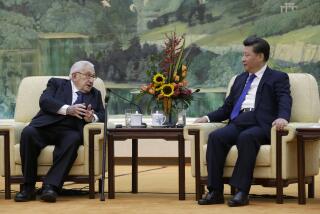Clinton Choice Signals Pressure for Rights in China
- Share via
WASHINGTON — In a sign of its desire to press harder for human rights in China, the new Administration on Tuesday named Winston Lord, the strongest and best-known critic of the Bush Administration’s policy of reconciliation with Beijing, as its assistant secretary of state for East Asia.
Lord, a longtime aide to former Secretary of State Henry A. Kissinger and U.S. ambassador to China under Presidents Reagan and Bush, was for years an advocate of close strategic ties between Washington and Beijing.
But after China’s 1989 crackdown on democracy demonstrations in Tian An Men Square, Lord reversed direction. Over the last three years, he has called repeatedly for new American policies that avoid high-level contact with Beijing and that make progress on human rights a precondition for the annual extension of China’s trade benefits. He also attacked Bush for sending what Lord called “fawning emissaries” to China.
The seeming shift in China policy by the incoming Clinton Administration was underscored Tuesday when White House sources confirmed that in its final days in office, the Bush Administration granted a license for the unprecedented export of a high-speed supercomputer to China.
The Administration overrode objections by Defense Department officials who said that the $2-million Cray Research supercomputer, which is being bought by China’s State Meteorological Administration, could be converted for use in advanced weapons research.
Clinton’s appointment of Lord could have important implications for other Asian nations. For example, at least based on Lord’s past experience, he is unlikely to be sympathetic to pleas to move more rapidly toward normal U.S.-Vietnam relations.
Although Lord has broken with his old mentor Kissinger on China policy, he shares the bitterness that Kissinger and many of his associates feel toward Hanoi for having, in their view, deceived the United States in the Paris peace talks and repeatedly violating the 1973 peace accords.
Lord has little in the way of a track record on American relations with Japan and South Korea. In the past, he has been preoccupied mostly with questions of diplomatic strategy and geopolitics and has not shown any special interest in economic or trade issues.
Lord’s appointment was hailed by human rights groups and by supporters of a tougher stand on China.
“I’ve always deferred to the wisdom of Winston Lord on China policy,” said Rep. Nancy Pelosi (D-San Francisco), sponsor of legislation to link China’s trade benefits to progress on human rights.
In contrast, business groups eager to sell to China were less enthusiastic. “Win is an old friend of mine. We have something of a different opinion on most-favored-nation status for China,” said Don Anderson, head of the U.S.-China Business Council.
Lord, 55, is married to the Chinese-American writer Betty Bao Lord. After working for Kissinger, he served as president of the Council on Foreign Relations from 1977 to 1985 and then as ambassador to Beijing until the spring of 1989.
The supercomputer that China will acquire has a speed of 958 million calculations per second. Until now, the United States and its allies have not sold Beijing any computer with a speed of more than 70 million calculations per second.
A spokesman for Cray Research said Tuesday that the company has not yet been officially notified that its export license has been approved. Before Cray can complete the sale of the supercomputer, it must obtain the approval of Cocom, the multinational group set up by Western allies to limit exports to Communist countries. Officials at Cray note that even with the new supercomputer, China would have only about one-twentieth of the computing power of advanced nations.
More to Read
Sign up for Essential California
The most important California stories and recommendations in your inbox every morning.
You may occasionally receive promotional content from the Los Angeles Times.









